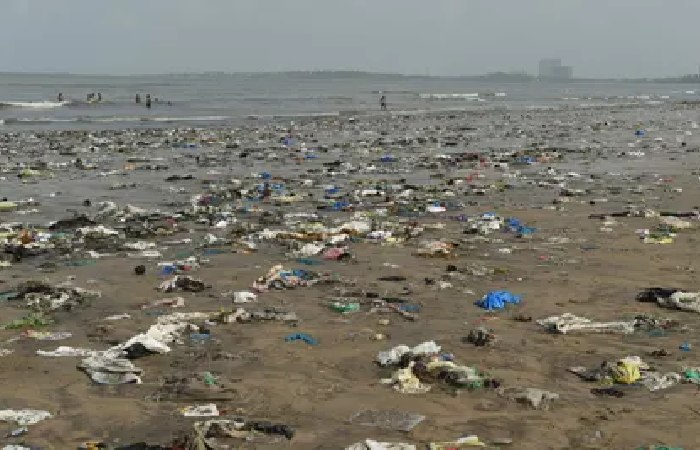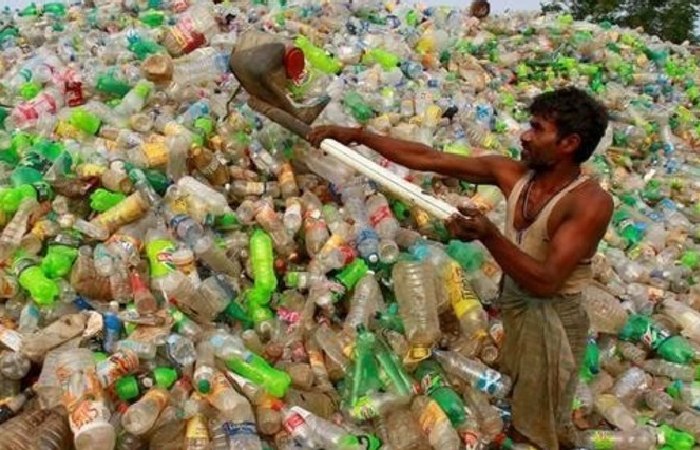RajkotUpdates.news, a prominent news website in India, recently reported on PM Modi’s commitment to eliminating single-use plastics in India. As reported in rajkotupdates.news: pm modi india happy to join single use plastics.
As the world grapples with the problem of plastic pollution, India is taking proactive steps to address the issue. In a recent speech, Prime Minister Narendra Modi expressed his commitment to phasing out single-use plastic and announced that India would be happy to launch a global initiative on the issue together with France. The announcement was made during Modi’s virtual address to the One Ocean Summit, an event organized by France as part of the French presidency of the Council of the European Union.
PM Modi in virtual address at One Ocean Summit, says India will be happy to join France in launching global initiative on single-use plastic
India recently launched a nationwide awareness campaign to remove plastic and other litter from coastal areas.
As reported by France organized the One Ocean Summit with the United Nations and the World Bank to protect and promote healthy ocean ecosystems. Prime Minister Narendra Modi congratulated French President Emmanuel Macron for organizing the event during his virtual speech and called it an “important global initiative for oceans.”
Additionally, Modi emphasized India’s commitment to eliminating single-use plastics and supported France’s “High Ambition Coalition on Bio-diversity Beyond National Jurisdiction” project. He emphasized the recent national initiative in India to remove plastic and other waste from the country’s coastlines. He gave the Indian Navy the order to devote 100 ship days this year to eliminating plastic waste from the ocean.
The One Ocean Summit is being held as part of the French Presidency of the Council of the European Union. In his speech, Prime Minister Modi said that India has always been a maritime civilization, and ancient Indian scriptures and literature speak of the oceans’ bounty, including marine life.
Overall, the One Ocean Summit inspires the international community to take effective steps to promote and preserve sustainable ocean ecosystems. India is dedicated to supporting this cause and doing much to save the oceans.
PM Modi: India will be happy to join hands with France to launch single-use plastics

Many nations are taking action to lessen their reliance on single-use plastics as concerns about the effects of plastic waste on the environment increase. India is among them, and Prime Minister Narendra Modi has expressed the country’s commitment to eliminating single-use plastics. Modi also stated that India would be pleased to join France in creating a worldwide push against single-use plastics in a recent video address to the high-level portion of the One Ocean Summit.
Modi praised France for hosting the summit, calling it a “major global initiative for the oceans.” He pointed out that India recently launched a nationwide awareness campaign to clean up plastic and other garbage from coastal areas, with 300,000 youth collecting almost 13 tons of plastic waste. Modi has also instructed the Indian Navy to contribute 100 ship days to clearing ocean plastic waste this year.
India’s commitment to phasing out single-use plastics is part of its broader Indo-Pacific Ocean Initiative, which recognizes the importance of marine resources as a critical pillar of the country’s security and prosperity. The initiative includes a range of measures to promote sustainable marine development, such as the conservation of marine biodiversity, maritime safety, and disaster risk reduction.
The problem of plastic pollution is a pressing concern for India as the country is one of the world’s largest producers of plastic waste. According to a report by the Central Pollution Control Board (CPCB), India generates around 26,000 tons of plastic waste daily, ending up in landfills, rivers, and oceans. The issue is exacerbated by India’s inadequate waste management infrastructure, resulting in widespread waste and illegal dumping.
PM Modi India Happy To Join Single Use Plastics

To address this problem, the Indian government has launched several initiatives in recent years. In 2018, he announced a national plan to phase out single-use plastics by 2022, focusing on reducing plastic waste in the marine environment. The program includes measures such as promoting alternatives to single-use plastics, promoting plastic recycling, and imposing fines for littering.
India is also working with international partners to address the plastic pollution problem. In 2019, it joined the UN Clean Seas Campaign, which aims to engage governments, the private sector, and civil society to reduce marine litter. As part of the campaign, India has committed to phasing out single-use plastics by 2022.
India’s efforts to tackle plastic pollution are commendable, but much remains to be done. The problem of plastic waste is a global problem that requires a coordinated and comprehensive response. In this sense, India’s willingness to join France in launching a global initiative on single-use plastics is a positive step. The initiative could help raise awareness of the issue and encourage the uptake of sustainable alternatives to single-use plastics.
However, the success of such an initiative depends on the commitment and collaboration of all stakeholders, including governments, industry, civil society, and individuals. Governments must lead in setting policies and regulations to promote sustainable practices, while industry must invest in research and development of sustainable materials and products. Civil society and individuals must also do their part by reducing single-use plastics and supporting recycling and waste management initiatives.
What Are The Major Challenges To Plastic Waste Management?
- Mismanaged plastic waste dumped openly is a major challenge, leading to ocean microplastics and the creation of trash islands like the Great Pacific Garbage Patch.
- Spurious biodegradable plastic is also a challenge, with a lack of testing and certification leading to unverified claims.
- Online and e-commerce companies are contributing to the rise in plastic waste.
- Microplastics, which can move the food chain to human consumers, are a significant challenge.
- Marine litter and plastic pollution in freshwater and marine environments are estimated to account for 60-80% of marine plastic waste.
- Terrestrial plastic is also a significant contributor, with 80% of plastic pollution originating from land-based sources.
What Are The Practical Ways To Control Plastic Pollution?
- Raising public awareness of the harm caused by plastic pollution through behavior change education and awareness programs.
- Finding substitutes for single-use plastic and ensuring alternative livelihoods for producers, recyclers, and other groups involved in the business will go a long way toward solving the problem.
- The government should impose fines for non-compliance, and In addition to proper monitoring, it is essential to promote responsible consumption.
- Identify and engage key stakeholders such as retailers, consumers, industry representatives, local governments, manufacturers, civil society, environmental groups, and tourism associations to ensure broad buy-in.
- Citizens must also change their behavior and do their part by not throwing away and helping to separate and manage waste.
India Takes Bold Steps to Tackle Plastic Pollution 2023

Following are some steps taken by government to control plastic pollution in India
India’s bold steps to tackle plastic pollution include increased registration and coverage under EPR for plastic packaging, support for MSMEs transitioning to eco-alternatives, and state initiatives promoting eco-alternatives to ban single-use plastic items.
- Increased Registration and Coverage under EPR for Plastic Packaging.
- Support for MSMEs Transitioning to Eco-Alternatives.
- India Plastic Challenge Hackathon 2021 and National Expo on Eco-Alternatives.
- State Initiatives in Promotion of Eco-Alternatives to Banned Single-Use Plastic Items.
Final Verdict on Rajkotupdates.News: PM Modi India Happy To Join Single Use Plastics
In conclusion, as reported by rajkotupdates.news: pm modi india happy to join single use plastics. India’s commitment to removing single-use plastics and its willingness to join France in launching a global initiative on the issue is a positive step towards addressing the problem of plastic pollution. The problem of plastic waste requires a coordinated and comprehensive response, and all stakeholders must work together to find sustainable solutions. By taking proactive steps to tackle plastic pollution, India is demonstrating its commitment to promoting sustainable development and protecting the environment.
FAQs On Rajkotupdates.News: PM Modi India Happy To Join Single Use Plastics
What are single-use plastics?
Single-use plastics products (SUPs) are only used once or shortly before being discarded. This plastic trash has global and potentially severe environmental and health implications. Products made of single-use plastic are more likely than reusable alternatives to end up in our oceans.
How can the government reduce plastic pollution?
The government can reduce plastic pollution by implementing policies such as
- Banning single-use plastics
- Promoting eco-friendly alternatives
- Improving waste management systems.
Which plastics are banned?
The banned plastics may vary by country, but commonly banned items include single-use plastic bags, straws, and cutlery.
Which kind of plastic bag is banned by our government?
The government has banned plastic bags below 50 microns in thickness in India and certain single-use plastic items, such as
- cups
- plates
- cutlery
What is the government action on plastic pollution in India?
The government of India has taken various actions to address plastic pollution,
- Including implementing Plastic Waste Management Rules,
- Launching nationwide awareness campaigns
- Partnering with other countries
- Organizations to promote sustainable practices.
What are the steps taken for the ban of plastic?
Steps taken for the ban on plastic may include conducting studies and research on the impact of plastics.
- Drafting and passing legislation
- Raising public awareness and education
- Implementing enforcement mechanisms
- Such as fines or penalties for non-compliance.
What steps has the Indian government taken to address plastic pollution in the country?
- The Indian government has implemented a nationwide ban on certain types of single-use plastics. Launched awareness campaigns
- Directed the Navy to contribute to cleaning plastic waste from the seas.
Which types of plastics are banned in India?
The plastics banned in India include polythene bags with thicknesses of less than 50 microns. Plastic bags are used for packaging gutka, tobacco, pan masala, and plastic cutlery.
Related Searches
join free will
one ocean summit upsc
india cxx
rajkotupdates न्यूज़ पीएम मोदी इंडिया हैप्पी टू जॉइन सिंगल यूज प्लास्टिक





